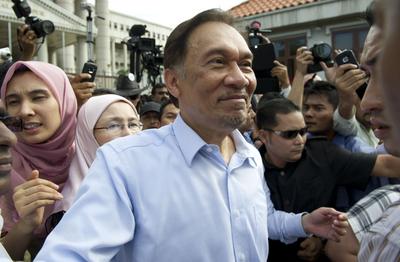Despite the challenging global conditions, Malaysia’s economy is expected to meet its 2011 targeted growth rate of 5–5.5 per cent. Domestic growth was strong, owing primarily to the expansion of consumer demand, and this compensated for the lower-than-expected export growth of 6.8 per cent. Yet further expansion in household consumption is unlikely, given the already high level of household debt, which stands at 70 per cent. Similarly, the government’s fiscal expansion ability is increasingly constrained as public debt approaches 60 per cent of GDP.
The rising cost of living also remains a major economic and political issue. The prices of selected perishable goods jumped because of a supply shortage in the first quarter of 2011. And while general inflation remained low at 3.4 per cent, food prices increased by 6 per cent. The government took steps to reduce costs by building affordable housing, constructing the Mass Rapid Transit rail system in Kuala Lumpur, subsidising key food staples and capping road toll increases. In addition, the government made direct-transfer payments to low-income households, students and the rural population.
The ruling coalition, Barisan Nasional, found firmer ground in 2011. It won most by-election contests, reversing a previous losing trend. The opposition component parties, meanwhile, have yet to resolve their differences on fundamental issues, such as the Pan-Malaysian Islamic Party’s demand for an Islamic state and the implementation of Hudud law.
The government stole some thunder from the opposition, Pakatan Rakyat, in September when it repealed the Internal Security Act (ISA) and other emergency laws. But its efforts to improve human rights were marred when the government mishandled the Bersih 2.0 rally, where thousands protested to demand a clean and fair election. Further, the partial replacement of the ISA and the recently passed Peaceful Assembly Act have both been criticised by the legal fraternity as an attempt to control freedom of assembly and speech.
The continuing recession and potential financial meltdown in the euro zone are sure to dampen demand for Malaysian exports in 2012. Malaysia’s exports to the EU fell from 9.4 per cent of GDP during 2001–2008 to 7.4 per cent during 2009–2010, while exports to China grew from 6.7 per cent to 14.6 per cent. Hence, the weaker demand from the euro zone is a worry, but any slowdown in the Chinese economy would create more anxiety.
Wage issues may be contentious in 2012. As part of the push to become a high-income economy with correspondingly high productivity, a new public-sector remuneration scheme has been announced which includes higher wages and an exit policy for non-performers — but public-sector employees have not readily embraced the scheme. For the private sector, a decision on whether the government will announce a minimum wage is expected soon. Still, there is a lot to do to reconcile what trade unions want (the reduction of poverty and improved living standards) and what the employers feel they need (increased productivity and competitiveness).
The 13th general election, widely expected to be held in 2012, will be a game changer, likely to overshadow the possible negative impacts from the euro zone. In the run-up to the election, the government will probably tweak the economy to ensure favourable conditions. Programs to address issues like the rising cost of living, the crime rate, employment opportunities and the ETP’s implementation will be fast tracked. Conversely, macroeconomic measures such as normalising fiscal and monetary policies, as well as other structural reforms may be deferred until after the election.
Politically, 2012 will be a highly charged year. The announcement of the court verdict on Anwar Ibrahim will impact Pakatan’s prospects. Anwar is critical to the opposition coalition’s cohesiveness. Without Anwar, Pakatan would have been hard pressed to find a prime ministerial candidate who is acceptable to all Pakatan component parties and Malaysians.
Although Barisan Nasional has regained some political ground since 2008, it is still grappling with many issues. For example, in trying to win over non-Malay voters, the party is in danger of alienating Malays — its core supporters. The watch word now in use is that Barisan’s candidates must be ‘winnable’, meaning they must be seen as serving the interests of their constituents, have untainted reputations and be competent at their jobs. Human rights and governance issues will take centre stage for urban voters, but for rural areas, which are Barisan Nasional’s stronghold, development will win the most votes.
All things considered, economic growth in 2012 may not outperform the achievements of 2011, but it will be comfortable. We must also look beyond 2012 — what if the global economy recedes into a long period of very low growth? The solution will be to carry out potentially painful structural transformation to boost growth and competitiveness. Most importantly, the outcome of the keenly contested general election will determine Malaysia’s path in 2012 and beyond.
Mahani Zainal Abidin is Chief Executive at the Institute of Strategic and International Studies, Malaysia.
This is part of a special feature: 2011 in review and the year ahead.

